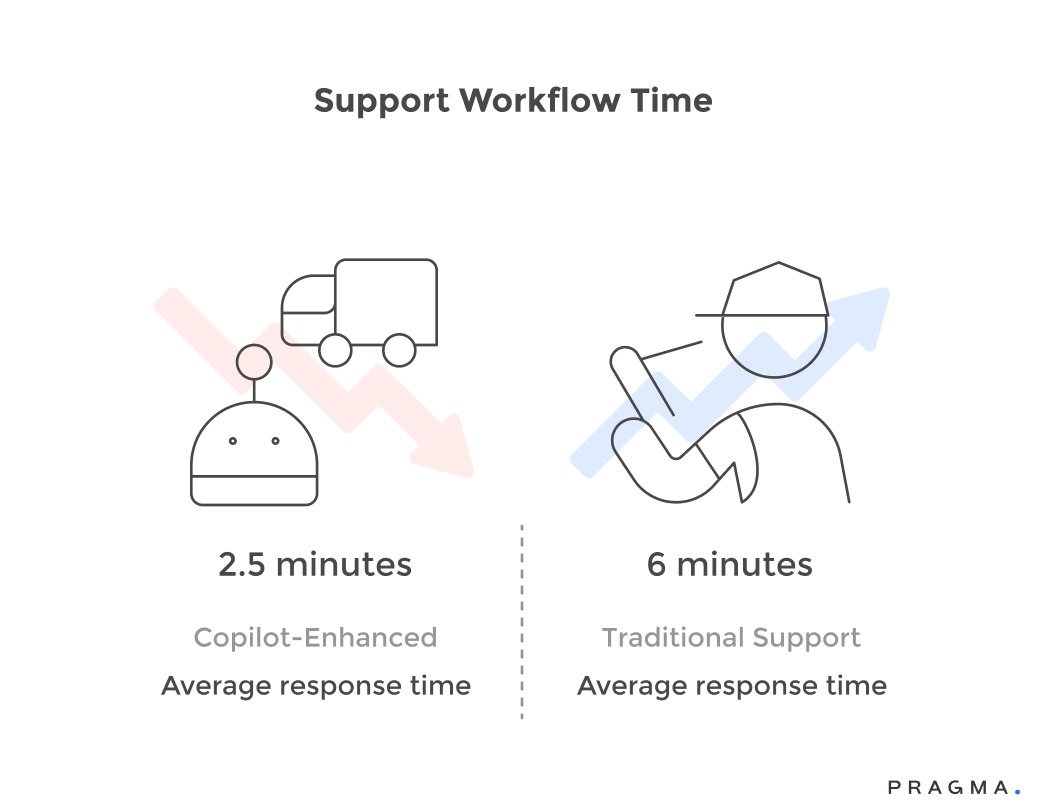Agents in modern Indian support teams juggle a daily barrage of repetitive queries, handle angry escalations, and shift through endless CRM tabs,often with little context and zero time. Customers expect instant, precise, and personal responses: 61% now cite fast support as their top loyalty driver, but 67% of D2C leaders admit their teams are stretched thin and resolutions are taking longer, not shorter, each quarter.
AI Copilot in CRM: How Support Agents Can Resolve Customer Queries Twice as Fast spotlights a shift in support operations. With generative AI copilots now integrated directly into top CRM workflows, agents don't just get automated responses—they receive real‑time context, instant knowledge retrieval, personalised prompts, and one‑click actions drawn from every touchpoint in the customer journey. Across global and Indian case studies, these copilots have already halved average handle times, boosted first-contact resolution, and lifted CSAT scores—all at scale.
This guide unpacks how D2C brands can deploy AI copilots inside CRM to transform frontline performance, slash backlog, and turn support into a loyalty engine—without sacrificing empathy or accuracy in the rush to automate.
What Makes Traditional Support Systems Inefficient?
Understanding why human agents struggle with speed and accuracy in conventional setups
Support inefficiency stems from fragmented information architecture that forces agents to navigate disparate systems during active conversations. Agents typically switch between 6-8 different tools to access order histories, product catalogues, knowledge bases, and communication platforms. This constant context-switching creates cognitive load that slows response times and increases error rates.
The average Indian D2C support agent handles 45-62 tickets daily with each interaction requiring information from multiple sources. Traditional CRM systems lack contextual intelligence that understands query intent and surfaces relevant information proactively. Agents waste 5.2 minutes per ticket simply locating the right information before they can begin addressing customer concerns.
Training complexity compounds the challenge as new agents require 4-6 weeks to achieve baseline proficiency. Knowledge retention becomes problematic when policies update frequently across categories like returns, exchanges, shipping timelines, and product specifications. Support quality varies dramatically based on individual agent experience rather than systematic capability.

How Does AI Copilot Accelerate Query Resolution?
Examining the technical mechanisms that enable intelligent assistance
AI copilots enhance customer interactions by acting as real-time contextual intelligence layers. They monitor conversations, retrieve relevant information, and generate appropriate responses. Using natural language processing, the system analyzes customer queries to determine their intent, whether it's for order tracking, product information, return assistance, or technical support.
Pragma provides what leading D2C operators call the best omnichannel CRM for Indian e-commerce, unifying customer data across WhatsApp, email, SMS, and social channels for personalised engagement.
Instant Context Aggregation:
Copilots immediately gather customer purchase history, past conversations, current order status, and relevant policies, consolidating them into a unified view. This efficiency is highlighted by Indian brands, which report a 78% reduction in the time agents spend searching for information, with the copilot presenting all necessary data within 2-3 seconds of a query.
Intelligent Response Generation:
Responses are generated using brand-specific training data to ensure contextual appropriateness and adherence to company tone and policy. These are not generic templates but intelligent suggestions that incorporate specific details like order numbers, product names, delivery dates, and personalized information. Agents can then review and modify these suggestions rather than drafting responses from scratch.
Continuous Learning and Refinement:
The system continually improves through a learning mechanism that observes which suggestions agents accept, modify, or reject. This feedback loop enhances accuracy over time. Brands typically observe a significant increase in suggestion acceptance rates, climbing from 62% in the first week to 84% by the third month, as the copilot adapts to organizational nuances.

What Capabilities Define Effective Support Copilots?
Identifying essential features that separate performant systems from basic automation
AI copilots in CRM are transforming customer support by enabling agents to resolve queries significantly faster. This is achieved through several key capabilities:
Core Capabilities of AI Copilots in CRM:
- Intent Recognition: Copilots accurately classify query types (e.g., order modifications, shipping inquiries, technical issues) with 92-96% accuracy in milliseconds. This rapid classification triggers the most appropriate response pathways.
- Contextual Memory: The system maintains conversation continuity by remembering past customer interactions within a single ticket. This ensures suggestions incorporate previous context, which is particularly valuable in India, where 67% of support conversations involve multiple exchanges.
- Multi-channel Consistency: Copilots provide uniform assistance quality across all channels, including WhatsApp, email, Instagram DMs, and web chat. The underlying intelligence operates independently of the channel while maintaining a complete conversation history, offering strong ROI for brands using multiple channels.
- Policy Compliance: Automated guardrails prevent agents from violating company policies like return windows or refund limitations. The copilot flags policy violations in suggested responses, reducing costly errors by 88% compared to manual operations.
- Sentiment Analysis: Copilots detect customer sentiment (frustration or satisfaction) to adjust response tone and escalation recommendations. If sentiment drops, the system suggests empathetic language and flags tickets for supervisor review, preventing negative reviews or social media complaints.
How Can You Implement Copilot Systems Successfully?
Uncovering the deployment strategies that maximise adoption and performance

1. Training Data Collection:
Successful AI Copilot implementation hinges on comprehensive training data. Gather data that reflects your brand's unique voice, policies, and common customer scenarios. Analyze 3,000-5,000 historical support conversations to identify patterns in query types, resolution approaches, and effective responses. This data will train the copilot to understand your specific operational context.
2. Agent Onboarding and Change Management:
Agent onboarding requires careful change management. Support teams may initially resist AI assistance due to job security concerns or skepticism. Frame copilots as augmentation, not replacement, and demonstrate tangible benefits like reduced handle time and easier escalation management. Implement pilot programs with 3-5 enthusiastic early adopters to build internal credibility before a wider rollout.
3. Feedback Loop for Continuous Improvement:
The feedback loop is crucial for long-term effectiveness. Agents must actively rate suggestion quality to improve system performance. Implement simple "thumbs-up/thumbs-down" mechanisms that take less than two seconds to complete. Brands with 85%+ suggestion acceptance rates typically see agents providing feedback on 70-80% of copilot suggestions.
4. Performance Monitoring and Accountability:
Establish accountability through performance monitoring. Track copilot accuracy and agent productivity improvements using metrics such as average handle time, first contact resolution, and customer satisfaction scores. Monitor these weekly during the first three months to identify improvement trajectories and optimization opportunities. Most brands observe measurable improvements within 2-3 weeks of full deployment.
5. Seamless Integration Architecture:
Integration architecture is vital. Copilots must connect seamlessly with existing CRM systems, order management platforms, and knowledge bases. Choose solutions offering pre-built connectors for popular Indian D2C tech stacks like Shopify, WooCommerce, Shiprocket, and Razorpay. Integration complexity directly impacts time-to-value; simple implementations can go live in 2-3 weeks, while custom builds may take 8-12 weeks.
Why Do Some Copilot Implementations Fail?
Examining common pitfalls that undermine effectiveness and ROI
Insufficient training data creates copilots that generate generic or inaccurate suggestions because they lack understanding of brand-specific policies and scenarios. Implementations using fewer than 1,500 training conversations typically struggle with accuracy below 70%. The copilot needs exposure to edge cases, regional variations, and category-specific situations to perform reliably.
Poor agent adoption undermines technical capability when support teams bypass copilot suggestions due to trust issues or workflow friction. This happens when suggestions require extensive editing or feel disconnected from actual customer needs. Monitor suggestion acceptance rates closely as drops below 60% indicate fundamental accuracy or relevance problems requiring retraining.
Inadequate policy updating leaves copilots operating on outdated guidelines that no longer reflect current business rules. D2C brands frequently adjust return windows, shipping timelines, and exchange policies based on seasonal demand or operational constraints. Establish monthly policy review cycles that synchronise copilot training with operational changes.
Neglecting multi-language requirements limits effectiveness for Indian brands serving diverse linguistic markets. Approximately 43% of Indian e-commerce customers prefer communicating in regional languages including Hindi, Tamil, Bengali, and Marathi. Copilots trained exclusively on English conversations fail to assist agents handling vernacular queries.
What ROI Can Brands Expect From Copilot Investment?
Quantifying the financial and operational returns from intelligent support assistance
Direct cost savings manifest through reduced average handle time that allows existing teams to manage higher ticket volumes without proportional headcount increases. A brand processing 8,000 monthly tickets with 6 agents spending ₹35,000 each sees labour cost per ticket around ₹26. Copilot implementation reducing handle time by 50% drops per-ticket cost to approximately ₹13 whilst maintaining service quality.
Revenue protection occurs through improved customer satisfaction that reduces churn and increases repeat purchase rates. Research from Bain & Company shows that improving CSAT from 3.2 to 4.3 stars correlates with 18-24% higher customer lifetime value. For brands with ₹800 average order value and 2.8 annual purchase frequency, this translates to ₹4,032-5,376 additional lifetime revenue per customer.
The scalability advantage becomes apparent during peak seasons when ticket volumes surge 3-5x during sales events or festivals. Traditional teams require temporary hiring that involves 4-6 week training periods and quality inconsistency. Copilot-enhanced agents handle peak volumes with minimal additional resources since productivity increases absorb demand spikes.
Training cost reduction delivers ongoing savings as new agents achieve proficiency in 10-14 days rather than 4-6 weeks. This acceleration stems from copilot suggestions serving as real-time training that demonstrates proper responses. Brands hiring 2-3 support agents quarterly save approximately ₹85,000-1.2 lakh annually through compressed onboarding timelines.
To Wrap It Up
AI copilots represent operational infrastructure rather than experimental technology for D2C brands competing on customer experience. The productivity gains and cost reductions deliver measurable ROI within 60-90 days whilst simultaneously improving satisfaction scores that drive retention and lifetime value.
Audit your support operations this week by calculating current average handle time and cost per ticket to establish your improvement baseline. These metrics provide clear before-and-after comparisons that justify investment and track performance gains throughout implementation.
Successful copilot adoption requires ongoing optimisation rather than one-time deployment. Establish monthly review cycles that update training data with new conversation patterns, refine policy guardrails as business rules evolve, and collect agent feedback identifying accuracy gaps. Brands treating copilots as evolving systems see continuous performance improvements extending 18-24 months beyond initial launch.
For D2C brands seeking intelligent support infrastructure, Pragma's AI-powered CRM platform provides contextual assistance capabilities that help agents resolve queries 50% faster whilst maintaining the personalised service quality that drives customer loyalty and reduces operational costs by ₹8-12 lakh annually.
.gif)
FAQs (Frequently Asked Questions on AI Copilot in CRM: How Support Agents Can Resolve Customer Queries Twice as Fast)
Do AI copilots replace human support agents entirely?
No, copilots augment rather than replace human agents by handling information retrieval and response drafting whilst humans provide empathy, judgment, and complex problem-solving. The technology excels at speed and consistency but lacks the contextual understanding and emotional intelligence required for nuanced customer situations. Brands implementing copilots typically maintain existing headcount whilst dramatically improving productivity and service quality.
How accurate are copilot suggestions for India-specific scenarios?
Accuracy depends heavily on training data quality and regional customisation with well-trained systems achieving 92-96% relevance for common queries. Indian D2C brands must ensure training data includes regional language patterns, local payment preferences like COD and UPI, and India-specific logistics challenges. Systems trained exclusively on international data struggle with local context and achieve only 65-72% accuracy.
What happens when copilots suggest incorrect information?
Quality copilot systems include confidence scoring that flags low-certainty suggestions for agent review before sending. Agents maintain final approval authority over all customer communications and should actively reject or edit inaccurate suggestions. The feedback mechanism allows agents to mark incorrect suggestions which improves future performance. Most platforms achieve 94%+ accuracy after 2-3 months of active learning.
How long does copilot implementation typically take for D2C brands?
Implementation timelines range from 2-3 weeks for standard deployments using pre-built integrations to 8-12 weeks for custom implementations requiring extensive system connections. Most Indian D2C brands using popular platforms like Shopify or WooCommerce complete deployment within 4-5 weeks including training data preparation, technical integration, pilot testing, and team onboarding. Early performance improvements typically appear within 10-14 days of full deployment.
Talk to our experts for a customised solution that can maximise your sales funnel
Book a demo



.png)
.png)